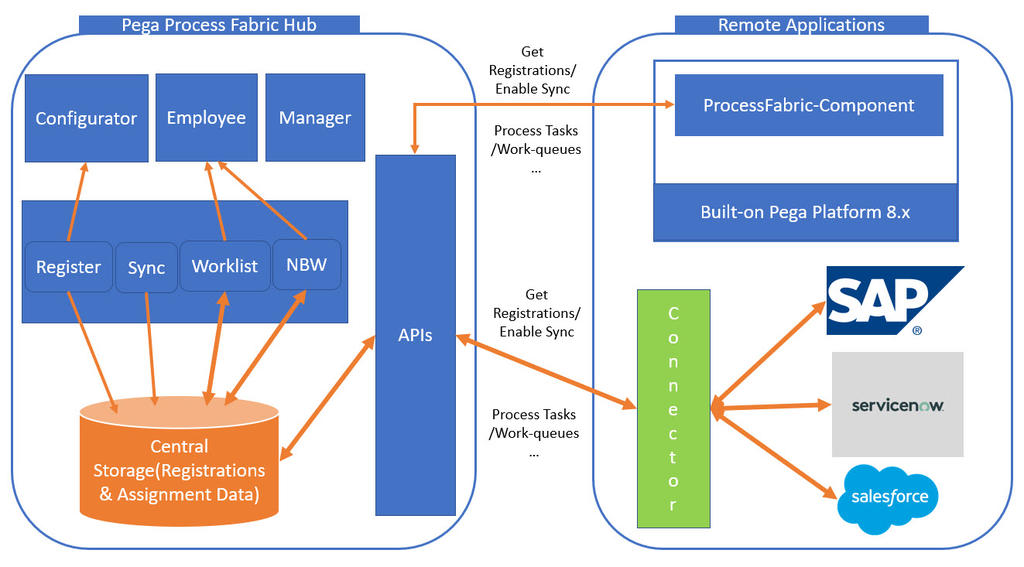
Pega Process Fabric Hub for the enterprise
In large enterprises, it is typical for developers to use several new and old technologies to construct separate applications to automate the business. Users commonly log in or switch contexts several times between applications during the workday to complete their work. Most of these applications exist in their own silo. Siloed applications increase the effort to complete tasks because the information is not easily shared between applications.
With Pega Process Fabric Hub, you can unify, manage, prioritize and automate the tasks related to employees or users by using data from multiple independent applications running on different technologies. This tool gives your managers and employees a single touchpoint for worklists, assignments, and insights. The tool helps connect and federate work directly from one application to another, allowing display, creation, and update cases between applications.
Consider the following scenario. A major bank has the following applications:
- Pega Platform™ to develop credit card and loan applications.
- ServiceNow to develop complaint management and account opening applications.
Tasks are routed to a worklist or work queue in each application. Analysts can perform those tasks by switching to or logging in to the independent applications that are hosted on different URLs.
Alternatively, the bank can use Pega Process Fabric Hub so that analysts can access tasks from several disparate applications. Logging into the Pega Process Fabric Hub lets analysts complete tasks from all applications without switching context multiple times during the workday, which saves time and increases efficiency.
Pega Process Fabric Hub uses open (REST) API architecture, which makes it possible for other open (REST) API-based applications to connect with the centralized Pega Process Fabric Hub application.
Beginning with Pega Platform version 8.1, the Pega Process Fabric Hub supports applications that are hosted on the following deployments:
- On-premise
- Pega Cloud® services
- Client-managed clouds
Pega Process Fabric Hub relies on case types and assignments and fetches data about assignments that users complete as part of case processing.
Pega Process Fabric Hub cannot support the tasks that users create in Pulse or Spaces.
The central storage of Pega Process Fabric Hub contains the following data:
- Application registry.
- Tasks of all registered applications.
- Association of operator work queues.
- NextBestWork/GetNextWork configuration.
In the following diagram, Pega Process Fabric Hub uses Rest APIs to register and sync assignment data from remote applications and persists the data in central storage. The ProcessFabric-Component is used to register or sync Pega Platform remote apps, while the external connector component is used for non-Pega remote applications. The Configurator persona is responsible for remote application registration. The User (Employee) persona has access to a Unified worklist or Next Best Work, and the Manager persona has access to insights.

- Unified Worklist
- Application Registry
- Insights
- Next Best Work
Pega Process Fabric Hub version 2.1 includes the following additional features:
- Pega-Salesforce connector
- Open APIs and documentation
- Partner-driven connectors
- Mashup into existing apps
- Extensible data model
- Followed cases
- Cosmos React Remote case types with DX API interactions
For more information, see Pega Process Fabric Hub.
Check your knowledge with the following interaction:
This Topic is available in the following Module:
If you are having problems with your training, please review the Pega Academy Support FAQs.
Want to help us improve this content?
